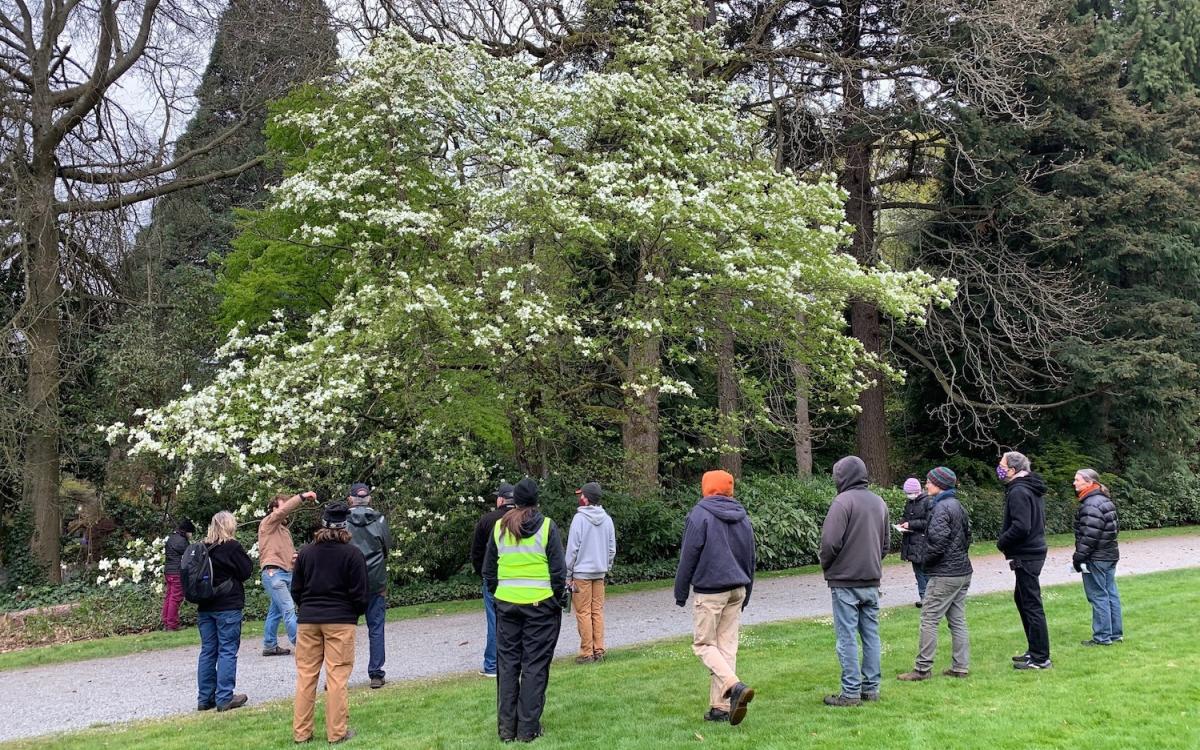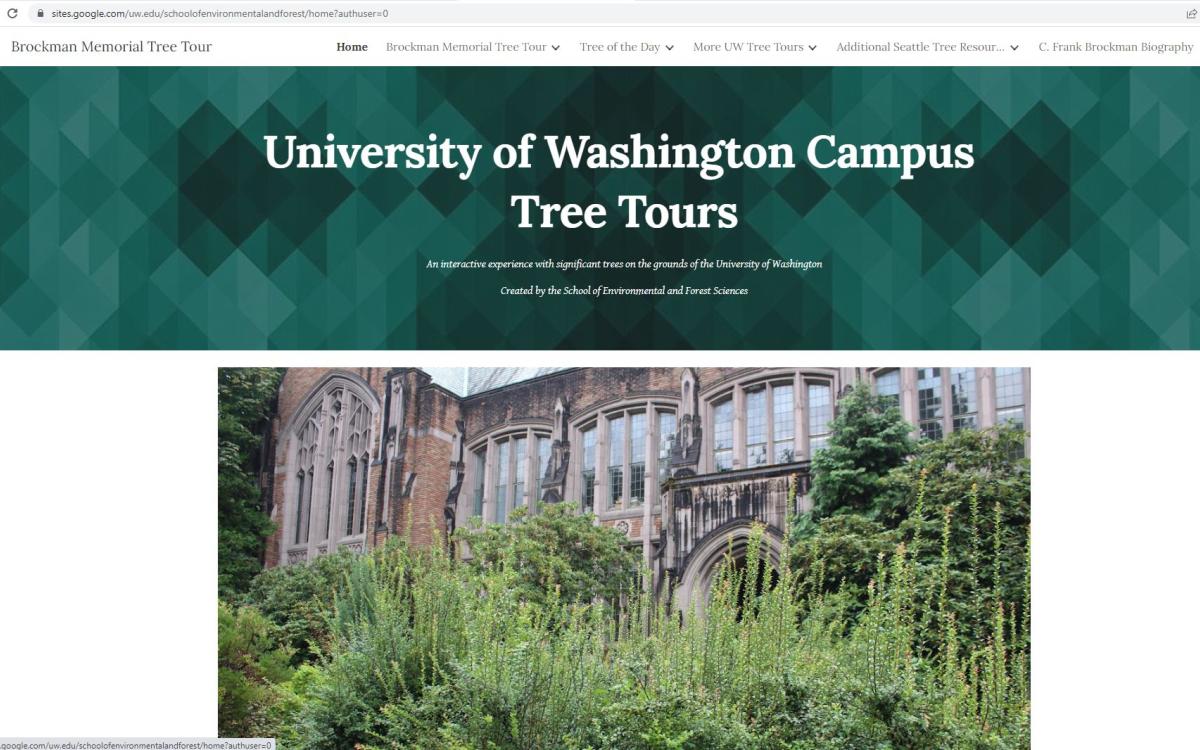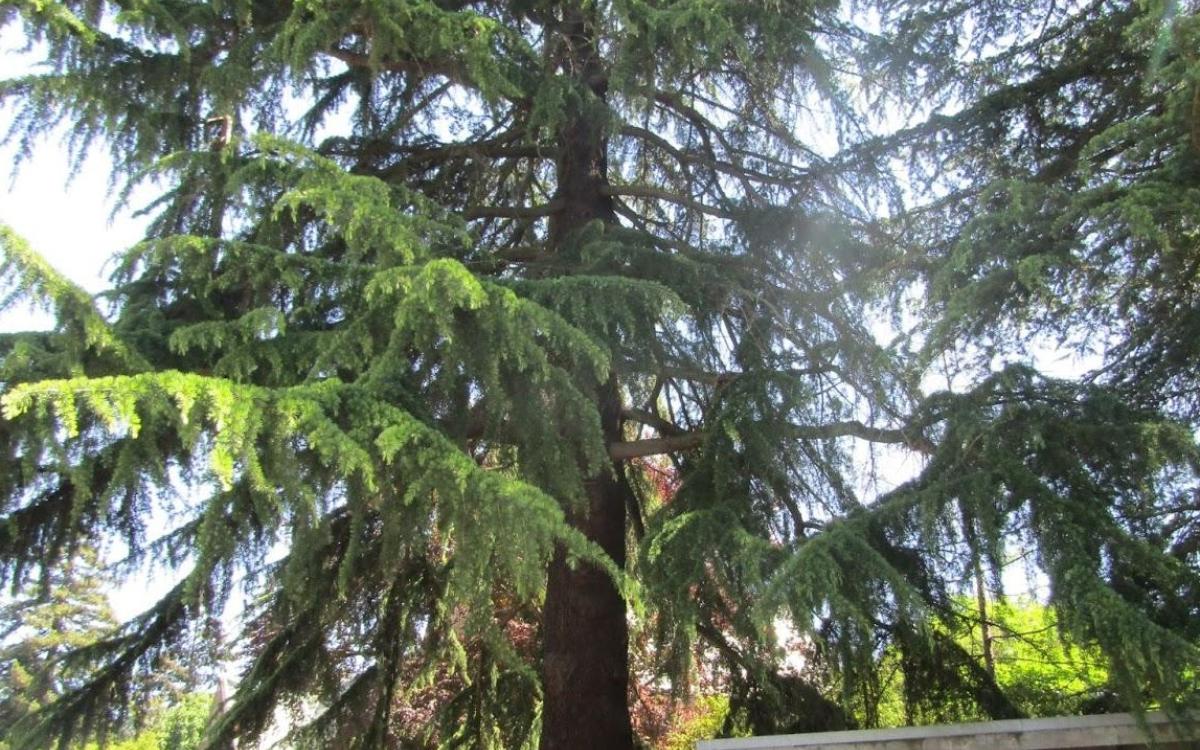At a glance
The Brockman Memorial Tree Tour received funding to enhance its connection with the campus community through Arboretum… Read full summary
- Funding received
- 2023-2024
- Mini
- Awarded
- $1,495
- Funding partners
-
- Services and Activities Fee (SAF)
The Brockman Memorial Tree Tour received funding to enhance its connection with the campus community through Arboretum Identification Tags. Over the years, the tour has grown, offering engagement opportunities with UW’s urban forest for students, faculty, and the broader community.
To maintain this momentum, the proposed funding aims to repair and expand the Arboretum Tags, introduce them in new areas, and reprint free tour guidebooks. The tour educates the public on the value of urban forests, fostering support for green space protection and sustainability. Improvements to tagging and guidebooks will boost awareness, participation, and access, building on past successes in increasing tour engagement.
Several years ago, the Brockman Memorial Tree Tour received a grant for renovations meant to expand and improve this historic campus resource. That funding allowed for the purchase of Arboretum Identification Tags to promote the ability of the tree tour to connect members of the campus community with the beautiful living laboratory that is the University of Washington Grounds. During the intervening years, the tour has continued to expand and grow, and has consistently provided opportunities for students, faculty, and outside community members to engage with the urban forest growing on campus.
In the interest of keeping up the momentum which has been built in expanding awareness of the UWCampus Tree Tours, this application for funding aims to update the Arboretum Tags used to identify tour specimens (some of which have been damaged) and to expand those tags into new areas on campus. We also hope to fund the reprinting of free tour guidebooks and publishing of a new guidebook to improve access to the tour.
This tour has demonstrated the ability to engage members of the campus community and general public with the urban forest to promote interest and support for a healthy urban forest. It is our belief that these trees can provide students and others visiting the campus with meaningful outdoor experiences that will help them empathize more with efforts geared at protecting and restoring green spaces and human nature interactions. Additionally, a recent addition to the tour website of an ecosystem services webpage provides a data driven evaluation of the value of over 10,000 inventoried trees on campus. By improving the understanding amongst students that urban forests offer not only a subjectively aesthetic backdrop but also critical and potentially costly ecosystem maintenance, the UW Campus Tree Tours provides education that will allow its participants to work towards a more sustainable future in policy, practice, and personal decisions. The purchase of the Arboretum tags and new guide books will help increase awareness of the tour, amplifying the afore mentioned effects, increasing awareness of native species and cultures, and providing greater access to more of the tour’s resources. Past efforts to increase awareness of the tour within the community (such as through the production of the Arboretum Tags and Print booklets) has led to increased participation in the guided Tree Tours, currently offered once or twice a month and garnering between 20 and 35 participants.
Theodore Hoss
Project lead
- tdhoss@uw.edu
- Affiliation
- Staff
- Affiliated groups
- University of Washington Grounds
Erik Ertsgaard
Team member
- eertsg@uw.edu
- Affiliation
- Student
- Years
- 1 year(s) remaining at UW
- Affiliated groups
- School of Environmental and Forest Sciences
Sara Shores
Campus Arborist
- sshores@uw.edu
- Affiliation and department
- UW Grounds
Request amount and budget
Plans for financial longevity
The Brockman Memorial Tree Tour was first established in 1980 and has been maintained ever since (albeit with an occasional hiatus of care). Since the renovation of the tour in 2020 it has been continuously curated and monitored on a voluntary basis. The tags will be monitored by members of the UW Grounds as well as students involved with the project, and efforts will be undertaken to ensure that there is always a student or staff member engaged with ensuring the upkeep of the tour even as involved individuals graduate or move on in their careers. The updates to the tour website and guided tours programing in the years since the revamping of the tour, as well as this application for materials to maintain the tour as it currently exists may be seen as evidence of the commitment to continued monitoring and upkeep of the resource.
Completion of this project will be the purchase and distribution of Arboretum Tags to trees around campus, and the completion and printing of an updated tour guidebook for the Brockman Memorial Tree Tour and new tour guidebook for the Native Tree Tour.
Contact with the most reasonably priced arboretum tag company has already been established, as has discussion with a department budget advisor. The purchasing of new arboretum tags will follow approval of this mini-grant, and once we hear back on whether we have been approved on this application we expect about a month to design the tags followed by about a 3-week period after ordering the tags for them to be delivered. The tags will be affixed with permission and oversight from UW Grounds, as task which is estimated to take 2 hours and can be accomplished within a week of delivery. The likely timeline from receipt of the grant to affixing of the tags would therefore be two months. The tags are designed to last long term, but will be monitored to ensure they remain in good condition. Trees are sometimes removed on campus for development, but this project accounts for future design impacting trees included on the tour and will ensure that the tour can maintain its function even as several of the specimens are removed in coming years.
The new printing of the tour guide books will be designed to account for known future tree removals (thus remaining up to date for longer). The Brockman Memorial Tree Tour Guide book is to be printed as a new edition to include replacement species for those lost over the last two years. Additionally, a new guidebook will be printed with a focus on Native Tree Species. A Native Tree Tour is already present on the tour website, but the print guidebooks offer another means of accessing the tour and offer opportunities to enjoy it free from technological interaction. Conversations have been opened with sustainability oriented student RSOs to seek students interested in volunteering to provide the material for the new Native Tree Tour Booklet. Since this is, in part, a reprint we already possess the knowledge of process for ordering copies from the UW Print Shop. The time from receipt of the grant to printing of the booklets is likely to take slightly longer due to the need for final edits to be made for the new edition of the Brockman Memorial Tree Tour Booklet, and completion of the new Native Tree Tour booklet. This will take an estimated 3-4 months from receipt of funding to having the booklets ready for distribution (with the intent being that they will be ready for the 2024-2025 school year). Reporting on the status of the grant will be monitored by Erik Ertgaard and Theodore Hoss with updates provided every month following the receipt of funding up until the conclusion of the proposed updates.
Plans for long-term project management
n/a
Problem statement
The vast majority of students on the University of Washington have limited exposure to resources meant specifically to connect them with the green spaces available right here on the Seattle campus. Studies have repeatedly shown that interaction with and connection to nature not only improve physical and mental wellbeing, but also bring about more sustainable lifestyles and practices in those taking the time to immerse themselves in the outdoors. However, this can be particularly difficult in the city, especially for a community which comes from a wide variety of locations within the state and beyond. How can one find a connection with a landscape whose community members and life they do not know? Some classes offered on campus provide the opportunity to engage with the natural world all around the UW, but they are limited in the number of students they reach. Thus, publicly available programs, events, and resources designed to help students find connection with the living beings that make up their world of campus are critical resources, and continued support of these resources is necessary to ensure they may be enjoying by many generations of students.
Problem context
The very first target of the UW Sustainability Action Plan is increasing the visibility of, and access to, sustainability in campus life, and implementing actions which include a wide range of education programs, collaborations, and volunteerism that touch the lives of nearly every student, staff and faculty member, as well as community members in the neighborhoods surrounding UW campuses. The UW Campus Tree Tours supports education programs by serving as a living laboratory for multiple classes, collaborates with a variety of RSO groups and organizations on campus and beyond, and has demonstrated the capacity to reach a diverse range of community members and connect them with sustainable resources. Additionally, the tour is fully supported by volunteer work.
Measure the impacts
| Impact / goal | Metric(s) of success | UW stakeholders impacted |
|---|---|---|
| Increase awareness of and engagement with the urban forest on the University of Washington Campus, and the community at large. | By community attendance at guided tree tours, website traffic, course use, and community inquiries. | Undergraduate, Graduate, Academic staff, Admin staff |
| Provide interpretive signage related to sustainability and the natural environment around campus green spaces. Stakeholders | Replacement of damaged tags, expansion of tags to new areas to campus | Undergraduate, Graduate, Alumni, Academic staff, Admin staff |
Communication tactics and tools
Communication is undertaken through social media, the School of Environmental and Forest Sciences Mailing List, the UW Events Calendar, the UW Campus Tree Tours Website, and direct collaboration with stakeholders, tour participants, third party organizations, and members of the community. Previously success of this communication has mainly been measured by discussion with participants of the guided tours, however, we hope to soon conduct a survey similar to that conducted in the year 2020 to gauge how impressions of the campus tree tour may have changed in the intervening 4 years.
Outreach communication plan
The UW Campus Tree Tours is already robustly integrated into many community organizations and departments. Significant effort is put into advertising the guided tours, as well as increasing collaboration opportunities, and information regarding this grant will be shared in those channels. Additionally, efforts will be made to ensure that this informational signage is placed in such a way that it is easily accessible to students and other campus visitors, such that the impacts of this project may be well appreciated.
Student involvement
While not specifically integrated into this section of the project, the Tree Tours have provided multiple opportunities for volunteer stewardship and environmental interpretation training (however the tour does not provide a paid position at this time). This maintenance of the tour hopes to provide volunteer opportunities by providing students with the chance to contribute to the production of the new Native Tree Tour guidebook.


